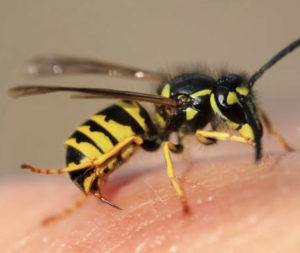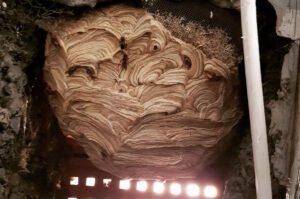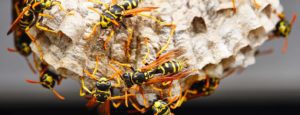When do Wasps start to nest build?
In the UK, many species of wasps start building their nests in the spring, typically when the weather starts to warm up. This can be anywhere from early spring to mid-spring, depending on factors like temperature and the availability of food sources. In warmer climates, wasps may start building nests earlier in the year. It’s important to note that different species of wasps may have slightly different nesting behaviours and timelines.
What materials are Wasp nests built from?
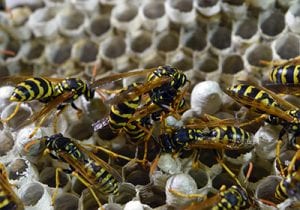
Wasp nests are typically built from a combination of organic materials. The exact materials used can vary depending on the species of wasp, but they commonly include:
Wood Pulp
Many species of wasps chew up wood fibres to create a papery material. They collect this material from sources like dead wood, fences, or even cardboard.
Saliva
Wasps mix their wood pulp with saliva to create a paste-like substance that they use to construct the nest. The saliva helps to bind the materials together and harden the nest as it dries.
Other Organic Materials
In addition to wood pulp and saliva, wasps may incorporate other organic materials into their nests, such as plant fibres, leaves, or even mud, depending on the species and environmental factors.
Overall, the combination of these materials allows wasps to construct sturdy and well-insulated nests that provide protection for their developing offspring.
Is it true that wasps can return to the same nesting points?
Many species of wasps exhibit a strong tendency to return to the same nesting sites year after year, especially if the site has proven to be successful in the past. This behaviour is particularly common among social wasps, such as paper wasps and yellowjackets, which form colonies and construct elaborate nests.
There are several reasons why wasps might return to the same nesting points:
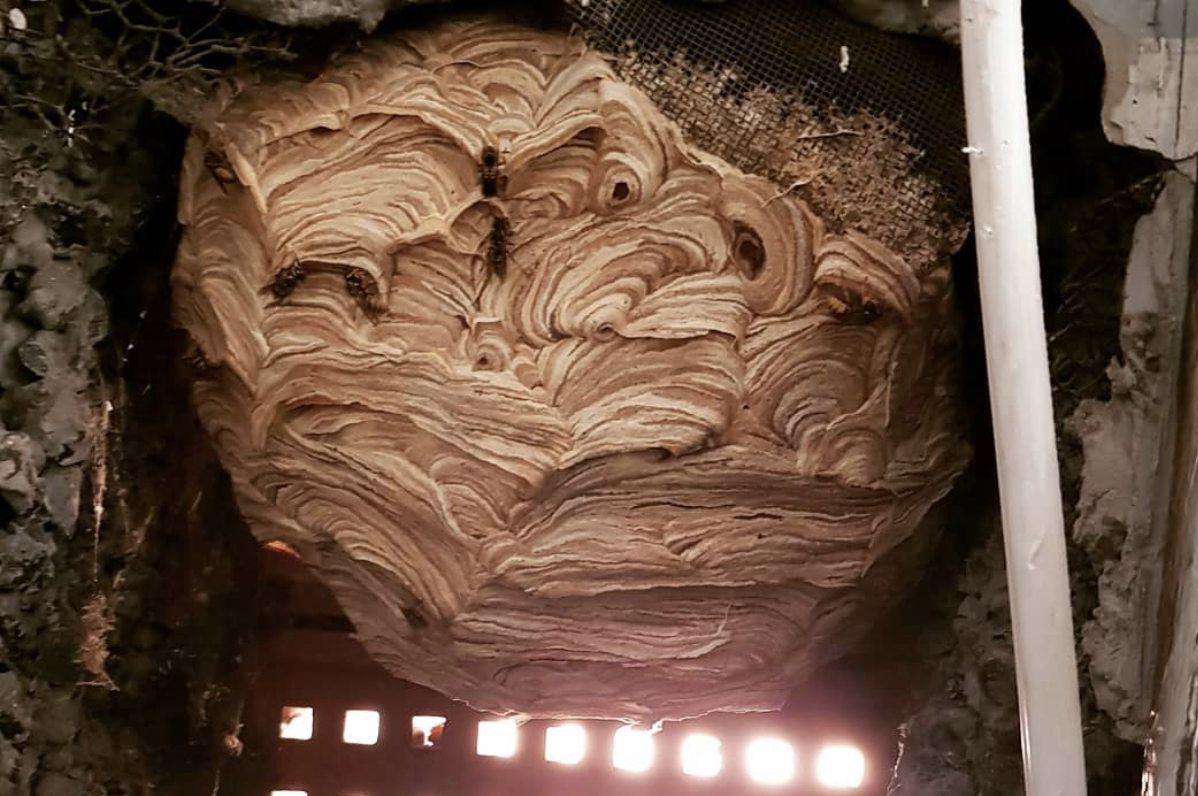
Site Familiarity
Wasps may return to familiar nesting sites because they know the area well and have already established suitable nesting conditions.
Resource Availability
Nesting sites that have provided ample food sources or other resources in the past are likely to attract wasps back again.
Nest Structure
Wasps may reuse the same nest structure if it remains intact and undisturbed, saving them time and energy that would otherwise be spent on constructing a new nest.
Pheromone Trails
Social wasps often leave scent trails (pheromones) leading to their nests. These trails can persist for some time and may attract returning wasps to the same location.
However, it’s important to note that not all species of wasps exhibit this behaviour, and individual circumstances such as nest disturbance or changes in environmental conditions can influence their nesting site selection. Additionally, solitary wasp species, which do not form colonies, may not exhibit the same level of site fidelity as social wasps.
What is the common life cycle of a Wasp?
In the UK, the life cycle of a typical social wasp, such as the common wasp (Vespula vulgaris) or the German wasp (Vespula germanica), follows a general pattern. Here’s an overview of the life cycle:
Queen Emergence (Spring)
The life cycle typically begins in the spring when the queen wasp emerges from hibernation. Queens that survived the winter seek out suitable nesting sites.
Once a suitable site is found, the queen begins to build a small nest and lays eggs. These eggs hatch into worker wasps.
Worker Emergence (Spring/Summer)
The first batch of eggs laid by the queen develops into sterile female workers. These workers take over the tasks of foraging for food, expanding the nest, and caring for the queen’s subsequent eggs.
As the colony grows, the queen continues to lay eggs, and the worker population increases.
Nest Expansion (Summer)
Throughout the summer, the nest grows in size, with the worker wasps constructing multiple tiers of cells to accommodate the developing larvae.
The colony becomes more active during this time, with worker wasps collecting food to feed themselves and the developing larvae.
Production of Reproductive Wasps (Late Summer/Autumn)
Toward the end of the summer, the colony begins to produce reproductive individuals, including new queens and male drones.
These reproductive wasps’ mate, and the fertilised queens seek out suitable sites to hibernate over the winter.
Colony Decline (Late Summer/Autumn)
As the weather cools in the autumn, the colony’s activity decreases, and food sources become scarcer.
Worker wasps become more aggressive as they scavenge for food, leading to increased encounters with humans.
By late autumn, the colony declines, and the remaining workers, drones, and old queen die off. Only the fertilised queens survive to hibernate over the winter.
Overwintering (Winter)
Fertilised queens seek sheltered locations, such as hollow trees or buildings, to hibernate over the winter. The rest of the colony, including the workers and males, die off due to the cold temperatures and lack of food.
This cycle repeats each year, with new colonies being founded by fertilised queens in the following spring.
Please be careful Wasp Nest Removal is not that Simple…
Removing a wasp nest, yourself is not a straightforward task, it requires expert knowledge and preparation. Wasps can build their nests almost anywhere, in airbrick covers, wall cavities and roof spaces. Depending on where the nest is located can make the job overly complex to access and remove.
So instead of falling victim to the next wasp nest removal DIY disaster, call in the professionals and have the wasp nest removed safely and stress free. Pest2kill offer a professional wasp nest removal service, call now 020 7205 2229
Pest2kill is s professional pest control company covering Essex and London, our team of highly trained professionals specialise in wasp nest removal and are here to help you eradicate any wasp problem you may have. Call us today to for further information, our London office 0207 205 2229 or our Essex office on 01708 941521.


